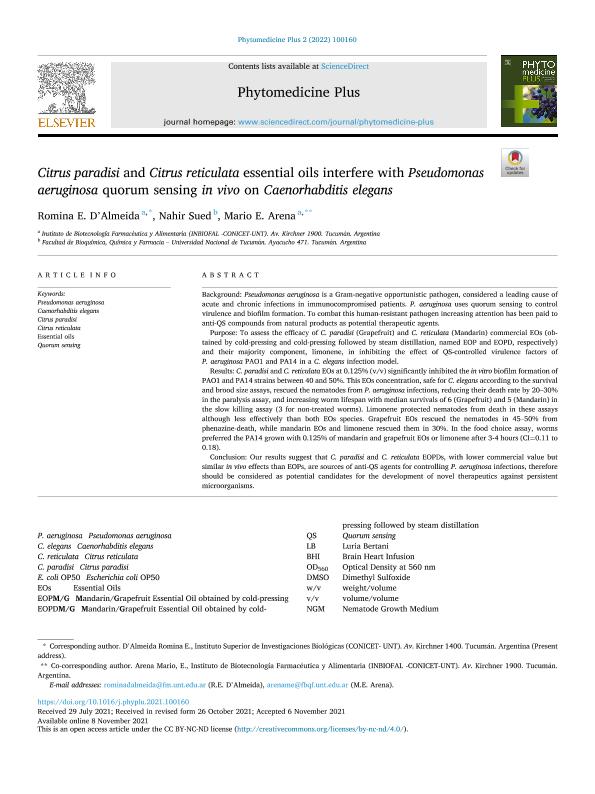Mostrar el registro sencillo del ítem
dc.contributor.author
D'almeida, Romina Elisa

dc.contributor.author
Sued, Nahir
dc.contributor.author
Arena, Mario Eduardo

dc.date.available
2023-01-11T13:51:09Z
dc.date.issued
2022-02
dc.identifier.citation
D'almeida, Romina Elisa; Sued, Nahir; Arena, Mario Eduardo; Citrus paradisi and Citrus reticulata essential oils interfere with Pseudomonas aeruginosa quorum sensing in vivo on Caenorhabditis elegans; Elsevier; Phytomedicine Plus; 2; 1; 2-2022; 1-7
dc.identifier.issn
2667-0313
dc.identifier.uri
http://hdl.handle.net/11336/184303
dc.description.abstract
Background: Pseudomonas aeruginosa is a Gram-negative opportunistic pathogen, considered a leading cause of acute and chronic infections in immunocompromised patients. P. aeruginosa uses quorum sensing to control virulence and biofilm formation. To combat this human-resistant pathogen increasing attention has been paid to anti-QS compounds from natural products as potential therapeutic agents. Purpose: To assess the efficacy of C. paradisi (Grapefruit) and C. reticulata (Mandarin) commercial EOs (obtained by cold-pressing and cold-pressing followed by steam distillation, named EOP and EOPD, respectively) and their majority component, limonene, in inhibiting the effect of QS-controlled virulence factors of P. aeruginosa PAO1 and PA14 in a C. elegans infection model. Results: C. paradisi and C. reticulata EOs at 0.125% (v/v) significantly inhibited the in vitro biofilm formation of PAO1 and PA14 strains between 40 and 50%. This EOs concentration, safe for C. elegans according to the survival and brood size assays, rescued the nematodes from P. aeruginosa infections, reducing their death rate by 20–30% in the paralysis assay, and increasing worm lifespan with median survivals of 6 (Grapefruit) and 5 (Mandarin) in the slow killing assay (3 for non-treated worms). Limonene protected nematodes from death in these assays although less effectively than both EOs species. Grapefruit EOs rescued the nematodes in 45–50% from phenazine-death, while mandarin EOs and limonene rescued them in 30%. In the food choice assay, worms preferred the PA14 grown with 0.125% of mandarin and grapefruit EOs or limonene after 3-4 hours (CI=0.11 to 0.18). Conclusion: Our results suggest that C. paradisi and C. reticulata EOPDs, with lower commercial value but similar in vivo effects than EOPs, are sources of anti-QS agents for controlling P. aeruginosa infections, therefore should be considered as potential candidates for the development of novel therapeutics against persistent microorganisms.
dc.format
application/pdf
dc.language.iso
eng
dc.publisher
Elsevier

dc.rights
info:eu-repo/semantics/openAccess
dc.rights.uri
https://creativecommons.org/licenses/by-nc-nd/2.5/ar/
dc.subject
CAENORHABDITIS ELEGANS
dc.subject
CITRUS PARADISI
dc.subject
CITRUS RETICULATA
dc.subject
ESSENTIAL OILS
dc.subject
PSEUDOMONAS AERUGINOSA
dc.subject
QUORUM SENSING
dc.subject.classification
Biología Celular, Microbiología

dc.subject.classification
Ciencias Biológicas

dc.subject.classification
CIENCIAS NATURALES Y EXACTAS

dc.title
Citrus paradisi and Citrus reticulata essential oils interfere with Pseudomonas aeruginosa quorum sensing in vivo on Caenorhabditis elegans
dc.type
info:eu-repo/semantics/article
dc.type
info:ar-repo/semantics/artículo
dc.type
info:eu-repo/semantics/publishedVersion
dc.date.updated
2022-03-08T22:20:26Z
dc.journal.volume
2
dc.journal.number
1
dc.journal.pagination
1-7
dc.journal.pais
Países Bajos

dc.journal.ciudad
Ámsterdam
dc.description.fil
Fil: D'almeida, Romina Elisa. Consejo Nacional de Investigaciones Científicas y Técnicas. Centro Científico Tecnológico Conicet - Tucumán. Instituto Superior de Investigaciones Biológicas. Universidad Nacional de Tucumán. Instituto Superior de Investigaciones Biológicas; Argentina. Universidad Nacional de Tucumán. Instituto de Biotecnología Farmacéutica y Alimentaria. Consejo Nacional de Investigaciones Científicas y Técnicas. Centro Científico Tecnológico Conicet - Tucumán. Instituto de Biotecnología Farmacéutica y Alimentaria; Argentina
dc.description.fil
Fil: Sued, Nahir. Universidad Nacional de Tucumán. Facultad de Bioquímica, Química y Farmacia; Argentina
dc.description.fil
Fil: Arena, Mario Eduardo. Universidad Nacional de Tucumán. Instituto de Biotecnología Farmacéutica y Alimentaria. Consejo Nacional de Investigaciones Científicas y Técnicas. Centro Científico Tecnológico Conicet - Tucumán. Instituto de Biotecnología Farmacéutica y Alimentaria; Argentina
dc.journal.title
Phytomedicine Plus
dc.relation.alternativeid
info:eu-repo/semantics/altIdentifier/doi/https://doi.org/10.1016/j.phyplu.2021.100160
dc.relation.alternativeid
info:eu-repo/semantics/altIdentifier/url/https://www.sciencedirect.com/science/article/pii/S2667031321001421
Archivos asociados
